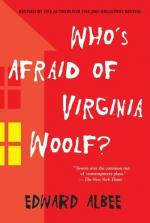|
This section contains 1,704 words (approx. 6 pages at 300 words per page) |

|
Truth and Illusion in Edward Albee's Who's Afraid of Virginia Woolf
Summary: Essay examines the thematic concerns of Truth and illusion in the play Who's Afraid of Virginia Woolf by Edward Albee. Closely investigates how truth and illusion play a direct role in the title of the play and how this title resonates throughout the work.
Edward Albee has said that the song Who's afraid of Virginia Woolf means who's afraid to live without illusion. In the play the song originated at the staff party from a play on the children's nursery rhyme who's afraid of the Big Bad Wolf? The Big Bad Wolf symbolizes the subconscious and instinctual internal fear of all the characters in the play. The title also refers to the fictional author Virginia Woolf. Virginia Woolf wrote about the elaborate and exciting yet purely illusionary lives of her characters thus exemplifying the world of illusion that each of the characters surrounds themselves in. As the play progresses the truth is slowly uncovered, and it becomes more clear to audience the extent with which the characters had surrounded themselves with their illusions. At the beginning it appears that Martha and George's marriage is based on illusion, Martha married George because of...
|
This section contains 1,704 words (approx. 6 pages at 300 words per page) |

|


